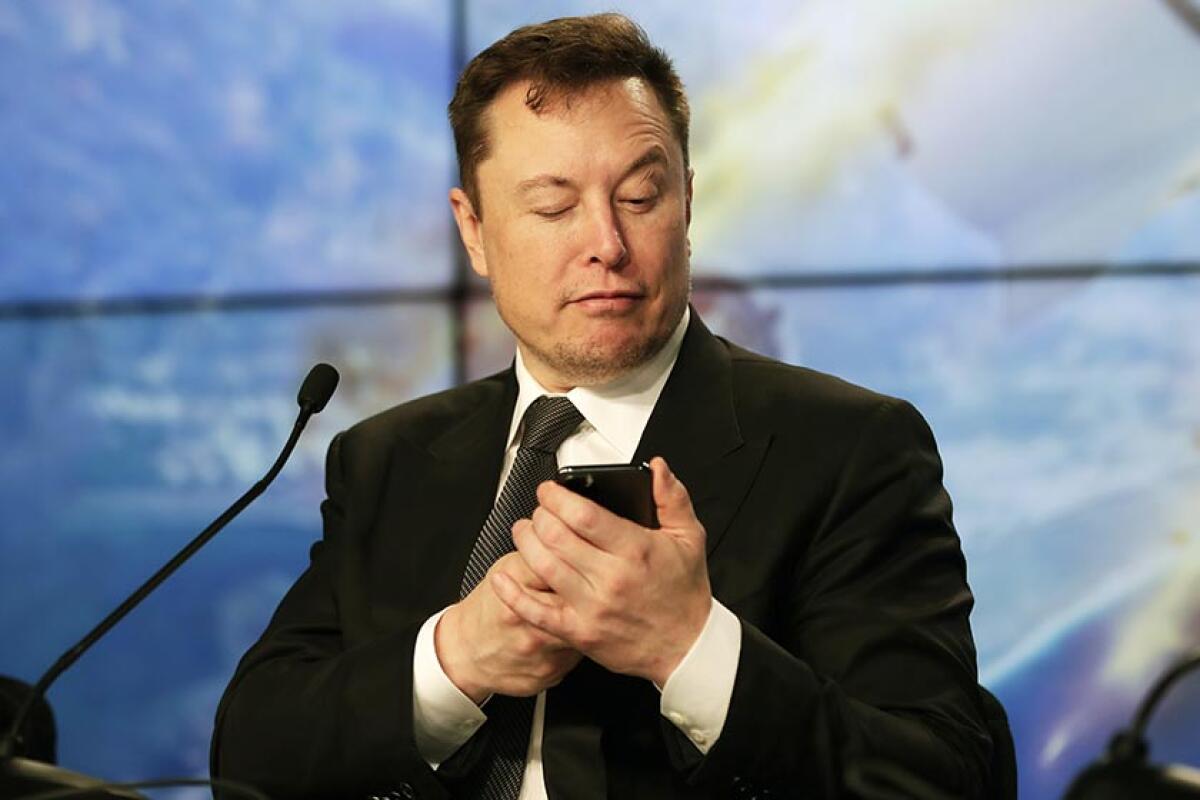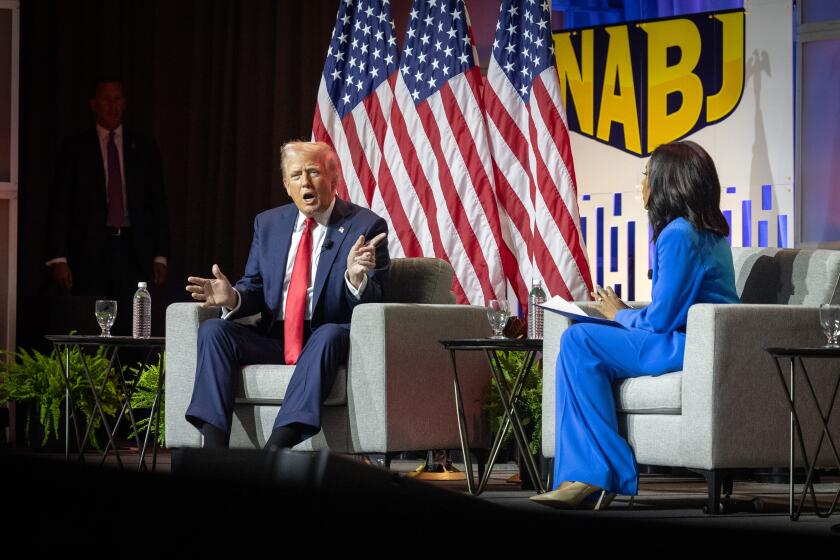Newsletter: Want to curb election misinformation? Invest in journalism

Good morning. I’m Kerry Cavanaugh, and it is Saturday, Aug. 3. Here’s what’s happening in Opinion.
Elon Musk recently caused a stir — I know, you’re shocked — when he shared a fake Kamala Harris campaign ad that used an AI-generated clone of her voice on his social media platform X without a disclaimer that the video was digitally altered. That may have violated the platform’s policy prohibiting the use of synthetic or manipulated media that could deceive or confuse people.
As of now, social media platforms are pretty much allowed to self-police how they respond to AI-generated images and audio that could influence elections, which doesn’t inspire much confidence. There’s no federal law regulating the use of deepfakes in politics, and only about one-third of states have enacted guardrails, not including California.
Gov. Gavin Newsom responded to Musk with his own post pledging to sign a bill soon to make it illegal to manipulate a voice in an “ad.” Musk, in his unique way, seemed to suggest the video was an obvious satire and thus exempt from X’s policy and, potentially, any laws because parody is a protected speech.
Because of Musk’s high profile and the national attention on the presidential race, the Harris deepfake was quickly identified, extensively covered and heartily debated. But what if this kind of fake video circulated about a candidate for the local school board or small-town mayor? Would it have been caught and debunked so fast and so broadly?
The Times recently concluded a series examining how economic forces and new technology have dramatically reduced local reporting in California, and how that affects the public. There are now fewer reporters covering cities and statehouses, who can be a check on deepfakes and misinformation in political campaigns. Yes, California and Congress need to enact laws banning deceptive deepfakes in election materials. But there’s also a need for independent local news journalists who can expose questionable campaign tactics in real time.
One promising proposal to bolster local news reporting is the California Journalism Preservation Act, or Assembly Bill 886, which would require that large social media companies and internet search engines, such as Google, share advertising revenue with the journalists and news organizations that produce much of the content on their platforms. As The Times’ editorial board wrote this week: “This is not just a crisis for news organizations, it’s a threat to the health of communities and democratic institutions.”
Would Trump stop free and fair elections? Hitler and Mussolini’s paths could be a clue. “Strongmen always tell us who they are and what they are going to do,” history professors Ruth Ben-Ghiat and Benjamin Carter Hett write. “With the example of the Fascists in mind, we should take Trump and his enablers seriously. The endgame of Republican election denial is not to challenge particular election results but to suppress free and fair voting altogether.”
Finally, a limit to Donald Trump’s Teflon superpower — J.D. Vance. Trump’s VP has been on the defensive for his specious societal critiques, namely deriding people who do not have children as sociopaths and cat ladies, and this time the former president may not avoid the fallout, writes columnist Jackie Calmes. “Finally Trump is having to answer for abhorrent remarks, even if they’re not his own, and potentially paying a political price. We can hope.”
Enjoying this newsletter? Consider subscribing to the Los Angeles Times
Your support helps us deliver the news that matters most. Become a subscriber.
I was homeless. Gov. Newsom’s order to dismantle encampments is outrageous. Les Gapay lived out of his car for more than six years and he writes that criminalizing homelessness or clearing out tents isn’t an answer when there’s no place to go. “A rich nation like the United States should be capable of compassion. Feed the hungry, help the poor, heal the sick, house the homeless, clothe the naked, welcome strangers. Until the Supreme Court and Newsom find a better solution, they ought to start there.”
Gov. Gavin Newsom is a reactionary on homelessness — and that’s a good thing. Sean Kennedy, the executive director at the Coalition for Law, Order, and Safety, sees the governor’s order differently. “Fewer camps and more consequences would be a good thing. What we really need is more asylums. But they are almost all shuttered — and that’s partly Ronald Reagan’s fault. And Gavin Newsom is poised to fix it,” he writes.
More from opinion
From our columnists
- Robin Abcarian: The Supreme Court is out of control. Here’s what it will take to rein it in
- Jonah Goldberg: It’s hard sharing a party with Trump or Vance. They taint the right’s good ideas
From guest contributors
- Obama was an avatar of hope. Harris has to be an avatar of give-’em-hell
- Trump 2.0 would be a disaster for the climate
- Trump proved himself unfit to be commander in chief
From the editorial board
- Religious freedom under attack in Oklahoma schools
- Supreme Court term limits and ethics reforms aren’t just good for Democrats
- How to end SoCal’s smog streak? Slash pollution from railways and ports
Letters to the Editor
- No matter what Paris does, a ‘green’ Olympics is impossible
- It’s time for Democrats and everyone else to put antisemites in their place
- ‘Literally insane’: Project 2025’s plan to end NOAA
Stay in touch.
If you’ve made it this far, you’re the kind of reader who’d benefit from subscribing to our other newsletters and to The Times.
As always, you can share your feedback by emailing me at paul.thornton@latimes.com.
A cure for the common opinion
Get thought-provoking perspectives with our weekly newsletter.
You may occasionally receive promotional content from the Los Angeles Times.




